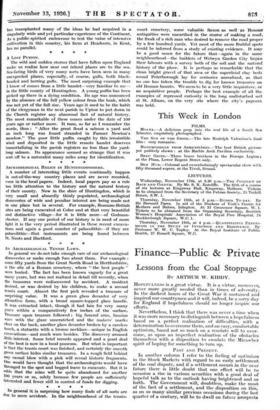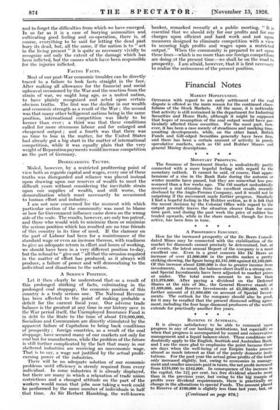Finance—Public & Private
Lessons from the Coal Stoppage
BY ARTHUR W. KIDDY.
HOPEFULNESS is a great virtue. It is a virtue, moreover, never more greatly needed than in times of adversity. In the darkest hours of the Great War it sustained and inspired our countrymen and it will, indeed, be a sorry day for England if hopefulness should no longer inspire our efforts. - Nevertheless, I think that there was never a time when it was more necessary to distinguish between a hopefulness based on a perfect realization of difficulties, with a determination to overcome them, and an easy, comfortable optimism, based not so much on a resolute will to over- come, as upon an imperfect realization of the obstacles themselves with a disposition to emulate the Mieawber spirit of hoping for something to turn up.
PAST AND PRESENT.
In another column I refer to the feeling of optimism in the- Stock Markets with regard to an early settlement of the coal dispute, and if a settlement occurs in the near future there is little doubt that orie effect will be to occasion a rise in various securities with a good deal of hopeful talk as to the outlook having brightened and so forth. The Government will, doubtless, make the most of the fact of a settlement, and the disposition on this, as on so many similar previous occasions during the last quarter of a century, will be to dwell on future prospects and to forget the difficulties from which we have emerged. In so far as it is a case of burying animosities and cultivating good feeling and co-operation, there is, of course, everything to be said for letting the dead past_ bury its dead, but, all the same, if the nation is to " act in the living present " it is quite as necessary vividly to recognize not only the extent of the damage which has been inflicted, but the causes which have been responsible for the injuries inflicted.
FACING FACTS.
Most of our post-War economic troubles can be directly- traced to a failure to look facts straight in the face. After making all allowance for the financial and social upheaval occasioned by the War and the reaction from the strain of war, we ought long ago, as a united nation, to have plainly recognized and acted upon certain obvious truths. The first was the decline in our wealth and economic strength as a result of the War ; the second was that many other belligerent nations being in the same position, international competition was likely to be keener than ever ; a third was that these conditions called for more strenuous labour and for enlarged and cheapened output ; and a fourth was that there was no time to lose in the matter, for the United States had already got a big start in the matter of international competition, while it was equally plain that the very weight of Reparation payments would increase competition on the part of Germany.
DISREGARDING TRUTHS.
Misled, however, by a restricted profiteering point of view both as regards capital and wages, every one of these truths was disregarded and reliance was placed instead upon drawing upon our reserves of wealth to meet the difficult years without considering the inevitable strain upon our. supplies of wealth, and still worse, the demoralization which must necessarily be occasioned to human effort and industry.
I am not now concerned for the moment with which particular section of the community was most to blame or how far Government influence came down on the wrong side of the scale. The results, however, are only too patent, and those who would wish to minimize them or minimize the serious position which has resulted are no true friends of this country in its time of need. If the clamour on the part of Labour had been for a maintenance of the standard wage or even an increase thereon, with readiness to give an adequate return in effort and hours of working, we should have been in a very different position to-day, but the refusal to " give out " all that the occasion required in the matter of effort has produced, as it always will produce, a failure of power and will demoralizing to the individual and disastrous to-the nation.
A SERIOUS POSITION.
•
Let it then clearly be understood that - as a result of this prolonged shirking of facts, culminating in the prolonged coal stoppage, the economic position of this Country is a truly serious one. The National Revenue has been affected to • the point of making probable a deficit for the current fiscal year. Our adverse trade balance is the greatest at any time in our history save in the War period itself, the UnemplOyed Insurance Fund is in debt to the State to the tune of about £19,000,000, Socialism and Communism are directly stimulated by the apparent failure of Capitalism to bring back conditions of prosperity ; foreign countries, as a result of the coal stoppage, have secured many of our markets not only for coal but for manufactures, while the problem of the future is still further complicated by the fact that many in our 'sheltered industries are receiving an uneconomic wage. That is to say, a wage not justified by the actual profit- earning power of the industries.
There will be no adequate solution of our economic problems until efficiency is sternly required from every individual. In some industries it is already displayed, but there are many in which a relaxation of trade union restrictions and a changed attitude on the part of the workers would mean that jobs now taking'a week could be performed by the same number of individuals in half that time. As Sir Herbert Hambling, the well-known banker, remarked recently at a public meeting, " It is essential that we should rely for our profits and for our Charges upon efficient and hard work and not upon measures designed to eliminate competition with a view to securing high profits and wages upon a restricted output." When the community is prepared to act upon these lines—which is no more than our foreign competitors are doing At the present time—we. shall be on the road to prosperity. I am afraid, however, that it is first necessary to realize the seriousness of the present position.















































 Previous page
Previous page